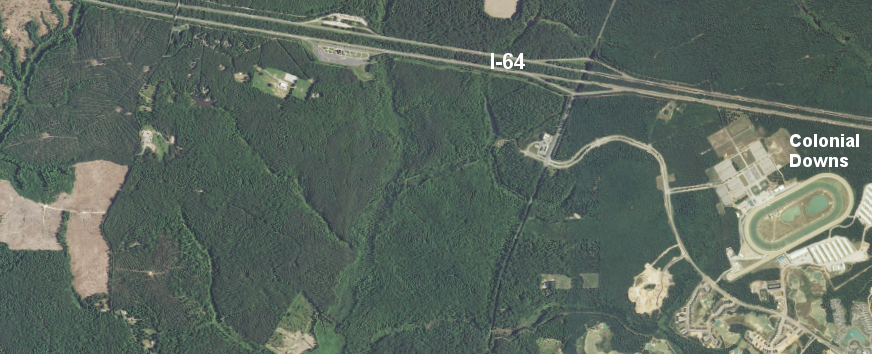
Colonial Downs was opened in a location so rural, there was no development at the nearest intersection on I-64
Source: US Geological Survey (USGS), Providence Forge 7.5x7.5 topographic quadrangle (2013)

Colonial Downs was opened in a location so rural, there was no development at the nearest intersection on I-64
Source: US Geological Survey (USGS), Providence Forge 7.5x7.5 topographic quadrangle (2013)
In 1988, Virginia voters approved a referendum authorizing a horse trach pari-mutuel betting. The new state law required that local voters must approve any racetrack within their jurisdiction, in a separate local referendum. Northern Virginia, the Richmond area, and Hapton Roads competed to become the home of the race track, in part because gambling on horse racing was expected to generate substantial tax revenue for local governments as well as for the state.
The first local referendum approval came from New Kent County in October 1989, followed by Prince William County a month later.1
In September, 1990, Loudoun County and four other jurisdictions authorized racetracks, followed by Portsmouth in 1992. The first Virginia races with pari-mutuel betting were in 1991-92 at Morven Park in Leesburg. Posters advertised "You can bet on it!" and betting clerks were brought in from the race track in Charles Town, West Virginia.
Few owners were willing to transport their horses to Leesburg for such a short meet. After two years of racing, Morven Park chose not to seek another license for almost 25 years.2
To incentivize someone to build a racetrack and attract a critical mass of race horses, the 1992 General Assembly authorized up to six Off Track Betting (OTB) parlors or "satellite wagering facilities" around the state. Despite moral concerns about gambling by various interest groups in the state, expanding the number of potential gamblers was viewed as essential to attracting an investor willing to spend $30-50 million to construct a new racetrack. In response to objections to gambling, the 1992 law required local approval for any OTB parlor (as the 1988 law required local approval for building a racetrack).
Six jurisdictions voted in 1992 to approve OTB parlors, including Richmond and Virginia Beach, and multiple investors began to pursue a state license for a racetrack with an unlimited license.
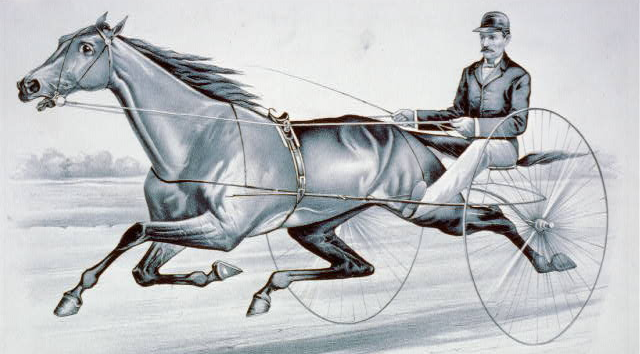
starting in 1998, the Colonial Downs racetrack in New Kent County offered pari-mutuel betting on harness races
Source: Library of Congress, The Celebrated trotting mare Daisydale, by Thornedale (1881)
The Virginia Racing Commission is the state agency that oversees pari-mutuel betting in Virginia, licensing jockeys, determining which drugs may be used by racing horses, and authorizing tracks. In 1994, the state agency considered six proposals. Two investors planned a track southeast of Richmond, while others proposed locations in Portsmouth, Virginia Beach, Loudoun County, or Prince William County.
Both locations in Hampton Roads counted on public funding from the Hampton Roads Sports Authority, which agreed to sell bonds to finance track construction. The owners of Churchill Downs - the racetrack that hosts the Kentucky Derby - chose a wheat field in Virginia Beach as their preferred location for building "Princess Anne Downs." The president company president had to confess, after awarding scholarships to local students who won the naming contest, that he had no idea who was Princess Anne. (She was the daughter of James II, queen of England between 1702-1714, and the person for whom Prince Anne County was named, before the county became the City of Virginia Beach.)
The Portsmouth site was advanced by a Virginia-based coalition. Its proposed location required tearing down 469 houses built in World War II, displacing 1,000 residents. The Portsmouth group claimed Churchill Downs would be an absentee landlord, one that only wanted to expand their gambling operating in Kentucky rather than grow the racing industry within Virginia. In a clue about what would come later, Churchill Downs noted that the population of race horses nationwide was shrinking, and expressed concern about the requirement that the Virginia track must offer at least 150 racing days per year within five years of the track's opening.3
Two investors proposed to build a track in Northern Virginia, which had the largest population in the state and therefore the greatest number of potential customers. The owner of the Pimlico and Laurel racetracks in Maryland had focused on putting a racetrack near Richmond. At the last minute before submitting his bid to the Virginia Racing Commission, he switched locations and proposed a $55 million "Patriot Park" in Loudoun County, north of Dulles airport on Waxpool Road near Ashburn.
His was not the only bid for the Northern Virginia market. A Middleburg resident with family ties to the racetrack in Puerto Rico submitted a competing offer for a track in western Prince William County near Haymarket; "Dominion Downs" would cost $45 million.
Both proposals were strongly opposed by conservative, anti-gambling activists. For the Virginia Racing Commission, the key difference between the two Northern Virginia choices was the capability to provide enough horses to keep a track busy for 150 days.
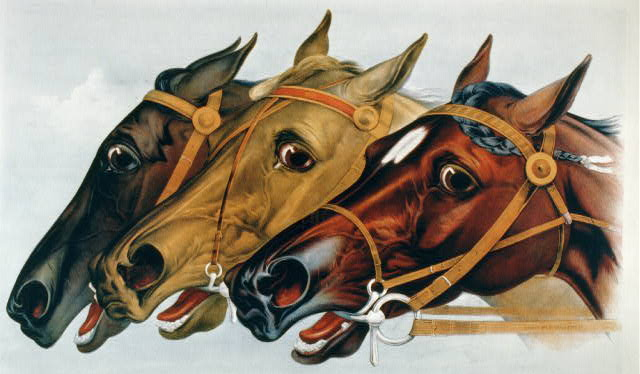
the competition for a Virginia racetrack license in 1994 was as intense as a horse race itself
Source: Library of Congress, Neck and neck to the wire (1881)
The advocate for the Loudoun proposal, Joe DeFrancis, was involved with the Maryland Jockey Club. He worried that a Virginia track would draw business away from his operations, but also realized that he could arrange for Pimlico and Laurel racetracks to close and steer their horses to a Virginia track during its season. De Francis stated bluntly:
Virginia opponents claimed his proposal would make a Virginia track just an adjunct operation to Maryland operations and "create a thoroughbred racing state called 'Marygin.'" Racehorses might not be available in Virginia immediately, but the law provided five years to reach the 150-day limit. That 150-day requirement was an essential tool to spur the horse industry in Virginia, to create and expand breeding stables that would supply Virginia horses for races rather than simply import horses from out-of-state. Since Thoroughbreds race as three-year olds, five years would provide enough time to build stables, train grooms and other farm hands, and breed the large number of horses required for a long racing season.4
Joe DeFrancis's plans for Loudoun County were blocked when voters determined in an August, 1994 referendum to reject any track. Loudoun's population had changed dramatically in four years of rapid suburbanization since the 1990 approval. New residents filled subdivisions primarily on the eastern edge of the county, and the 30% increase in registered voters over four years reflected a shift in priority from agricultural preservation to traffic congestion:5
De Francis did not abandon his efforts; instead, he arranged a partnership with a bidder who had proposed a New Kent County location. The partnership won the Virginia Racing Commission license awarded in 1994 for a pari-mutuel track, because De Francis had the greatest potential to supply enough horses for a season of racing.
The $45 million Colonial Downs racetrack was built on 345 acres in New Kent County halfway between Richmond and Williamsburg on I-64, and operated between 1997-2014. In contrast to modern proposals for using public money to finance sports stadiums, the Colonial Downs was built by private investors - though the county provided water and sewer infrastructure to the location.
Colonial Downs used a dirt track for harness racing in the Fall, plus 20% of Thoroughbred races and even motorcycle events. The unique characteristic of Colonial Downs was its wide turf (Bermuda grass rather than dirt) track:6
Maryland agreed to suspend racing at Pimlico and Laurel during the window when the Colonial Downs racetrack was racing Thoroughbreds, and Virginia's new horseracing industry ended up being dominated by out-of-state operators. Locating a track in New Kent County required Maryland horsemen to travel further than De Francis's preferred location in Loudoun County. The Portsmouth and Virginia Beach locations would have been even further away, requiring vans with horses to navigate through the traffic jams at the Hampton Roads Bridge-Tunnel. During the hearings at the Virginia Racing Commission, De Francis had described the challenge:7

Diomed was imported from England by John Hoomes of Caroline County, and is a founding sire of Thoroughbreds in the United States
Source: Library of Congress, Diomed (1792)
When it opened, Colonial Downs expected to generate most of its income from Off-Track Betting (OTB) parlors, not from visitors driving from Tidewater and Richmond to bet in person in the middle of rural New Kent County. A county planning commissioner later noted "Prior to Colonial, New Kent County was known as a backyard wood land of Chesapeake Corporation." The Washington Post sportswriter who reviewed the track in 1999 indicated that the rural location was a significant handicap:8
Back in 1989, advocates for building a track in Prince William County noted that there were 3.8 million people within a 45-minute drive of their Northern Virginia site, compared to only 1.8 million people within that radius of the site in New Kent County.
In 1994, when De Francis shifted his plans from the Richmond area to focus on a track in Loudoun County, he noted that there were "not enough people in the area between Richmond and Virginia Beach to sustain a racetrack." Twenty years later, when the Colonial Downs racetrack appeared ready to close after failing to generate adequate attendance, a Hampton Roads columnist said the "stately track remains a lonely outpost on the interstate between Richmond and Hampton Roads. A rest area. With hay.9
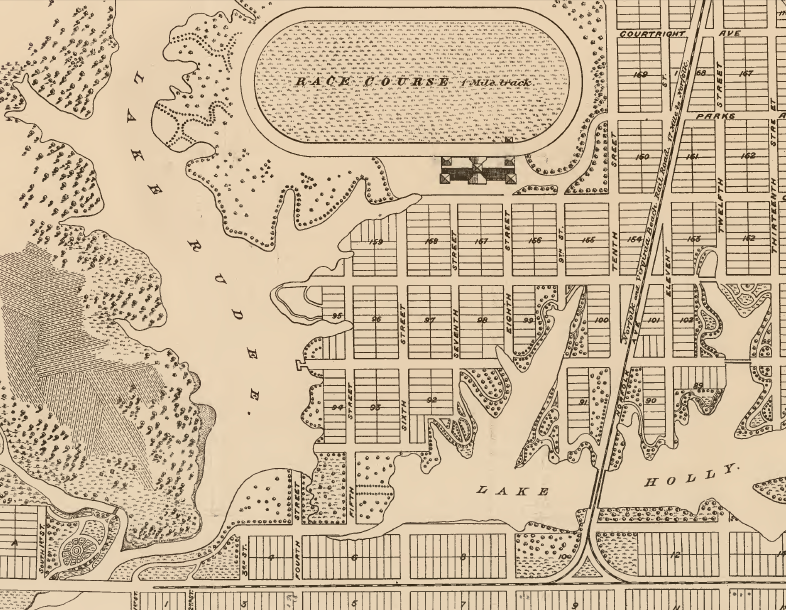
the location of the race track in Princess Anne County (now Virginia Beach), north of the Norfolk and Virginia Beach Railroad, was documented in a 1910 legal case
Source: Library of Virginia, A. Johnson Ackiss for etc. vs. E. H. Morrison (Chancery Records Index Number 1911-015, p.311)
Profits from the small number of races held at Colonial Downs, with a small number of people at the isolated track, were never expected to keep the track profitable. The key to profits would be betting by gamblers who were not physically at the track, wherever it was located in Virginia. That is why the Washington Post sportswriter thought in 1999 that Colonial Downs, while in the boondocks, had potential:10
The six OTB parlors were authorized by the General Assembly in 1992 to create investor interest in building a Virginia racetrack. Horse races run in other states would be simulcast to the OTB parlors. Wagers would be placed on those races as well as on races at the Virginia track, and the extra betting on out-of-state races would increase the "handle." The Virginia track would get a percentage of the greater revenue generated by additional betting, and local jurisdictions where the OTB parlors were located would receive more tax revenue.
The Virginia pari-mutuel betting racetrack license was awarded to Colonial Downs in New Kent County. Getting OTB parlors into operation turned into a major challenge, however. Just as the 1988 legislature had required local approval of a racetrack, the 1992 General Assembly required approval of local jurisdictions before an OTB parlor could operate. Despite extensive lobbying by Colonial Downs, several key communities used their power to block OTB parlors.
The first OTB parlor was opened in the City of Chesapeake in 1996, one year before the Colonial Downs racetrack was finished and held its inaugural events. Though more people lived in Virginia Beach and were potential customers, that city had rescinded its OTB approval after losing the competition for the racetrack itself.11
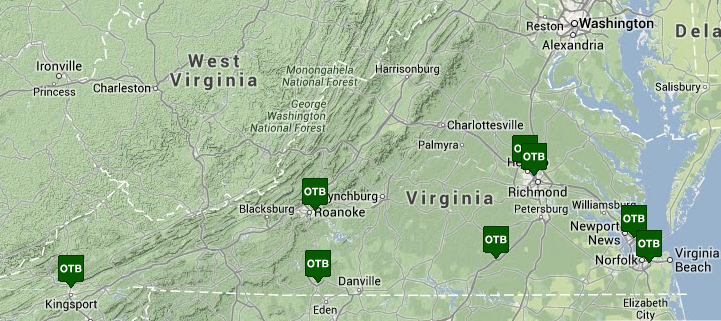
Off-Track Betting (OTB) parlors are located near the borders with Tennessee and North Carolina, but not Maryland or DC
Source: Colonial Downs OTB Locations
After Chesapeake, one of the first locations for an OTB parlor was near the town of Alberta in Brunswick County, halfway between Petersburg and the North Carolina border. That site was not chosen because the local population would keep the OTB parlor busy; in 2010, the US Census recorded less than 300 people in Alberta and less than 17,000 people in Brunswick County. The location was chosen because it is on Interstate 85. A betting facility there could draw customers from across the North Carolina line, as well as from Petersburg (40 miles away). An assessment of the Virginia horse industry in 2011 noted that 11% of the people attending horse races at Colonial Downs came from out-of-state, but 22% of customers at OTB parlors were from out-of-state.12

the OTB parlor in Alberta (blue X) was placed in rural Southside Virginia, far from where OTB customers live or work... but on I-85, easy for North Carolina residents to access
Source: ESRI, ArcGIS Online
Colonial Downs did get approval from both Henrico County and the City of Richmond, and then put a parlor on the border. Tax revenue from the site on West Broad Street was split between the two jurisdictions.
The parlors were located where they could draw customers from Hampton Roads, Richmond, and the states of Tennessee and North Carolina. No satellite racing center ever opened in Northern Virginia, where there was the greatest concentration of potential customers. Colonial Downs failed to consider the challenges of obtaining local support and local land use approval in its effort to provide an off-track betting facility for that market.
Local opposition, some of it concerned about the morality of betting and the potential for creating a focus for crime, blocked every proposal. The closest OTB parlor for customers in Northern Virginia, DC, and Maryland was 100 miles south of DC in Glen Allen, just north of Richmond.
In 1992, after the 1988 referendum authorized pari-mutuel betting and before the Virginia Racing Commission awarded a license to any racetrack, Fairfax City and Falls Church blocked any OTB parlors in their jurisdictions. In 1993, Arlington and Alexandria voters also rejected off-track betting. In 1997, Colonial Downs tried to open a betting parlor in Fredericksburg, but that was rejected in a referendum.
After rejection in larger jurisdictions in Northern Virginia, Colonial Downs twice sought approval from Manassas Park. Manassas Park was largely a suburb filled with commuters, and it first incorporated in 1975. The city lacked commercial development, and depended upon real estate property taxes to finance an expensive school system. Colonial Downs predicted that voters who lived in the houses paying high taxes would welcome a new revenue stream from an OTB parlor. Additional funding from gambling in Manassas Park could reduce property taxes or increase services.
Manassas Park rejected an OTB parlor in 1996 by 52-48%, despite endorsement of the proposal by the mayor, police chief and school superintendent. Moral objections to gambling overcame concerns about high local property taxes. In another election in 2004, betting was rejected by 62-35%. In the 2004 election, city officials stayed neutral in public, but the city police were accused of harassing a business owner in Manassas Park Shopping Center in order to break the lease and help Colonial Downs locate a facility there.
The company that had purchased Colonial Downs, Churchill Downs Inc., got the off-track betting issue on the ballot in Manassas Park again in 2023. It planned to open what would be, by that time, the eighth Rosie's Gaming Emporium in Virginia.13
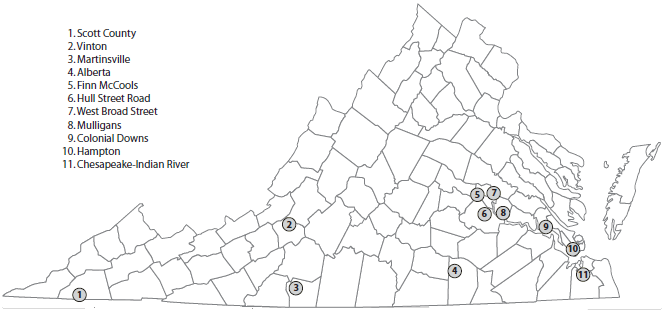
OTB parlors have been located at various addresses - but getting sites in Northern Virginia was slow
Source: "The Economic Impact Of The Horse Industry In Virginia," Weldon Cooper Center for Public Service, Virginia Pari-mutuel Racing and OTB Facilities (Figure 1.5)
In 1999, in another effort to gain access to the Northern Virginia market, Colonial Downs proposed opening a second track in Prince William County. The company planned to locate a steeplechase track at the site of the Potomac Landfill in Dumfries, at the intersection of I-95 and US 234. The 80-foot high pile of construction and demolition debris (Colonial Downs called it "Mount Dumfries") would be covered by grass. The horses would circle around the mound and, at times, be out of sight of the spectators.
The company claimed that a $20 million steeplechase track would generate up to $1.5 million annually in local tax revenue, generated in a small part by 20 days of steeplechase racing and in a large part by a year-round betting parlor. While a track at Dumfries would have increased betting beyond Colonial Downs' existing Thoroughbred and harness races, a steeplechase track would have competed with traditional point-to-point steeplechase races throughout the Piedmont.
Also in 1999, a competitor proposed a separate oval racetrack in western Prince William. If licensed, the Virginia Turf Club track would have competed directly with the Colonial Downs track. One proposed location was at the intersection of Route 15/Route 29 near the Fauquier County border; another was on Route 15 at Logmill Road (near the Loudoun County border), but the group finally announced it had purchases a site just west of Haymarket.14
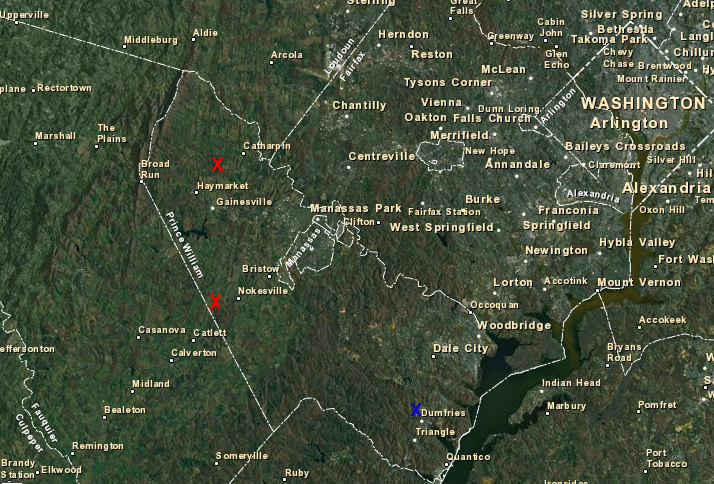
in 1999, two locations in western Prince William County were proposed for a horse racetrack, while Colonial Downs proposed a third location (blue X) at Dumfries
Source: ESRI, ArcGIS Online
The Town Council of Dumfries rejected any racetrack and gambling parlor, killing the hopes of Colonial Downs to tap into the Northern Virginia market. The Virginia Racing Commission then declined to award a second license for unlimited racing to the Virginia Turf Club, because Colonial Downs had lost $6.5 million since it opened and could not survive competition.
A key opponent of both 1999 track proposals in Prince William County was a local member of the Virginia House of Delegates, Rep. Bob Marshall. He failed to get the Virginia Attorney General to require another local referendum before the Virginia Racing Commission could authorize off-track betting in Prince William County, but was effective in his political efforts to block the tracks, in part by asserting:15
To increase the amount of money available in purses at the Colonial Downs races, and to help the racetrack become profitable, the General Assembly authorized four more additional OTB parlors in 2004. Later that year, Colonial Downs was able to get approval from voters in the Town of Vinton (next to Roanoke, which had rejected gambling in 1997) and from Henry County (adjacent to Martinsville, which also had rejected gambling in 1997).16
Westmoreland County on the Northern Neck approved gambling in 2004 as well. Colonial Beach had been the "Las Vegas of the East" in the 1950's, when slot machines were located on boats carefully parked in the Potomac River on the Maryland side of the boundary but accessed from piers on the Virginia shore. Slots were banned in 1959, but "boats" on the Maryland side of the border (such as The Riverboat, constructed on piers) managed to keep operating.
Hurricane Isabel destroyed The Riverboat in 2003. That briefly eliminated access from Colonial Beach to keno, Maryland Lottery ticket sales, and the off-track betting which had been approved in Maryland in 1992. After the Riverboat was rebuilt after the 2004 vote, Colonial Downs chose not to compete with it and never built a Virginia OTB parlor in Westmoreland County.17
Colonial Downs changed its strategy after expanding to Vinton and Henry County (Martinsville) in 2004. The racetrack expanded its business through "advance deposit wagering" (online betting) via EZ Horseplay using electronic kiosks in bars and restaurants, while competitors offered other online wagering systems. Thanks to online betting, there was no longer an incentive for Colonial Downs to spend time and money to obtain local approval for the remaining two authorized OTB sites. Building and operating two more OTB facilities would be an unnecessary cost.

Colonial Downs used videos to train customers on how to bet via EZ Horseplay kiosks in bars and restaurants
Source: YouTube, Colonial Downs EZ Horseplay Kiosk
Any Virginia resident who opened an EZ Horseplay account, including gamblers in Northern Virginia, could wager at kiosks or via the telephone/internet. EZ Horseplay offered opportunities to bet on races at nearly 100 different Thoroughbred or harness racetracks. Colonial Downs received 5% of the revenue from online bets, another 5% was directed to "representatives of the recognized majority horsemen groups," and 1% went to the Virginia Breeders Fund. In 2012, betting through EZ Horseplay exceeded 40% of the total amount of the "handle" (the amount bet on horseracing in Virginia) while business has declined at OTB parlors.18
The Colonial Downs business strategy from the beginning was to maximize profits rather than revitalize the horse industry in Virginia, and racetrack profits come from gambling rather than racing in New Kent County. Oversight by the Virginia Racing Commission supported the focus on expanding the gambling handle rather than expanding Virginia's horse industry, perhaps reflecting that the state agency was overseen by the Secretary of Commerce and Trade.
The General Assembly transferred the Virginia Racing Commission to the Secretary of Agriculture and Forestry in 2014. The shift was expected to increase pressure on the Virginia Racing Commission to increase horse breeding in Virginia, generating revenue for in-state agricultural operations.
Virginia-based horse owners who originally supported legislation to authorize pari-mutuel betting would benefit from an increase in the number of race days required by the Virginia Racing Commission. Since Thoroughbreds need roughly two weeks of rest between races, more race days would increase the number of horses at the track, which would increase the number of horses bred in Virginia, which would increase the number of employees involved in the horse industry, which would create the economic stimulus as promised in the campaign to legalize pari-mutuel betting.
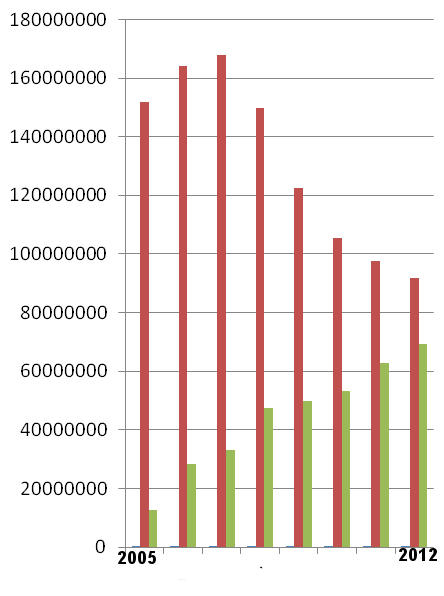
since online betting (in green) was authorized in 2004, it increased to over 40% of the total in 2012, while betting at Colonial Downs racetrack plus OTB parlors (in red) has declined since 2007
Source: Virginia Racing Commission, 2012 Annual Report
In 1999, the Virginia Turf Club had claimed it could offer almost 100 days of races annually if a new racetrack was approved in western Prince William County. That brought strong support from the horsemen, jockeys, grooms, and others in the industry, but the Virginia Racing Commission was unwilling to create a competitor to Colonial Downs.19
The initial 1988 legislation required a racetrack with an unlimited license (able to offer more than 14 days of racing/year) to offer 150 live racing days annually, after the first five start-up years. That 150-day requirement was expected to revitalize horse breeding in Virginia. The General Assembly did not want to legitimize betting though simulcasting of races held elsewhere, unless there would be some benefits for Virginia. However, the Virginia Racing Commission was granted authority to reduce the number of racing days if that was "in the best interest of the Virginia horse industry."
The initial 1992 General Assembly approval for OTB parlors required that races simulcast from outside the state could not exceed the number of races shown from the Virginia track. Unless the Virginia track raced for 6 months, the OTB parlors would have to close down for substantial parts of the year - so that constraint was loosened by a later General Assembly.20
When Colonial Downs opened, the Thoroughbred race season was only 30 days, and for the next two years it offered only 25-day seasons for Thoroughbreds (plus a harness race season of about the same length, starting in 1998). The ownership of the track was linked with the Maryland Jockey Club, and Colonial Downs offered Thoroughbred racing only when the Maryland tracks at Laurel and Pimlico were closed.21
The peak number of Thoroughbred race days at Colonial Downs was 79 days in 2008, but the number then dropped to an average of 30-45 days spread over eight-nine weeks. The racing season for Thoroughbreds was negotiated between Colonial Downs and the Virginia Horsemen's Benevolent & Protective Association (representing Thoroughbred owners, breeders, and trainers) and the Virginia Harness Horse Association (representing Standardbred owners, breeders, and trainers). The Virginia Racing Commission formally approved the season, typically after the contract between track and horse owners had been negotiated.

total pari-mutuel betting in Virginia (at Colonial Downs, OTB parlors, and online) peaked in 2007
Source: Virginia Racing Commission, 2012 Annual Report
Racetracks in the United States are offering fewer races, with the nationwide total dropping 50% between 1989-2018 (from 74,071 to 36,586 races annually). The demand for live racing is dropping. Gamblers are going to casinos or buying lottery tickets, rather than going to racetracks, going to OTB parlors in person, or using advanced deposit wagering options such as EZ Horseplay.
Horse racing was exempt from the Federal ban on internet gambling, but starting in 2013 states began to authorize online poker and other forms of competition for horse racing. By 2019, the Virginia Lottery was spending $1.5 million a month on advertising, selling over $2 billion in tickets, and generating over $600 million for K-12 public education and the Literary Fund.22
The Charles Town racetrack in West Virginia has been operating since 1933, and offers essentially year-round racing. Between 2002-2010, it averaged 238 live race meetings year - but revenue from that number of races was still not sufficient to keep the track operating profitably. Because interest in horse racing has declined, West Virginia authorized slot machines and table games (blackjack, craps, roulette, and poker) and in 2010 the racetrack morphed into "Hollywood Casino at the Charles Town Races." Maryland followed a similar path, offering a wider range of gambling opportunities at its racetracks to subsidize the horse-related economy in that state.23
One objective in the Virginia Racing Commission's strategic plan was to "increase the number of live race days" to enhance the entire horse industry in the state. However, the decline in races was matched by a decline in Thoroughbreds. Between 1992-2012, births of Thoroughbreds nationwide dropped 39% - but the decline in Virginia-born foals during those 20 years was 72%, from 652 to 184. Virginia's share of the annual Thoroughbred crop in North America dropped from 1.7% to 0.8%.24
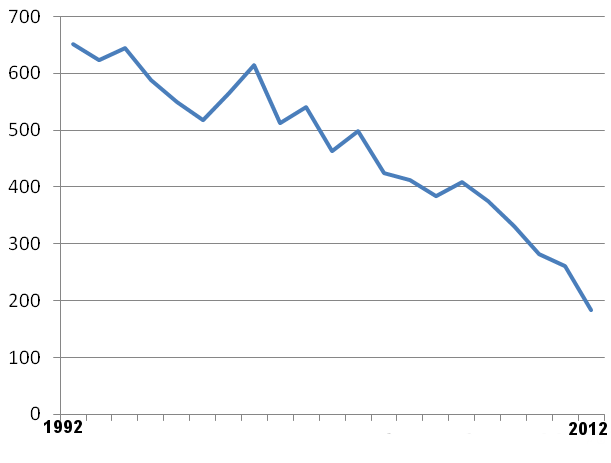
Virginia's number of Thoroughbred foals declined 72% between 1992-2012
Source: The Jockey Club, 2014 Virginia Fact Book
The relationship between the amount of prize money offered and the quality of the horses attracted to race is clear: bigger prizes attract higher-quality horses, including horses from out-of-state.
The Virginia Derby race at Colonial Downs offered a $1 million purse in 2006 and 2007. That was high enough to attract some of the three-year old Thoroughbreds that raced earlier in the season in the Triple Crown. The American Graded Stakes Committee ranks the Kentucky Derby, Preakness, and Belmont Stakes as Grade 1 stakes races, based on the quality of the participating horses. The Virginia Derby was rated Grade 3 in 2004 and raised to Grade 2 in 2006, typically attracting good-but-not-the-very-best horses.
In 2008, Colonial Downs reduced the Virginia Derby purse to $750,000. The season was extended from 40 to 45 days that year, and the track shifted money from the Virginia Derby to fund purses for the additional five race days. In response to the lower purse (down to $500,000 in 2013), more Thoroughbred owners decided to keep their horses based in New York and skip the Virginia race season. The tracks in New York offer consistently-higher purses, and the cost of shipping horses to Virginia was not justified by the lower potential winnings at Colonial Downs.25
It is easy to see why reducing the purse at Colonial Downs made it harder to attract out-of-state horses, and the reduced competition provided a greater opportunity for Virginia-based horses to earn prize money. Less obvious was the complicated relationship between the amount of prize money offered at Colonial Downs, the length of the racing season in Virginia, and how the season's length affected the economics of different components of the horse industry in Virginia.
If there were more races at Colonial Downs, there would be more demand for exercise riders, grooms, stable maintenance personnel, and jockeys in Virginia - even if they were maintaining horses imported from New York or elsewhere. Those workers would clearly benefit from a longer race season. (In Virginia, jockeys are independent contractors who sign a contract regarding their pay and working conditions with the Virginia Horsemen's Benevolent & Protective Association. Unlike the farm hands, in Virginia jockeys are not employees entitled to workers compensation or unemployment insurance.)26
In theory, Virginia-based horse owners/breeders would benefit like jockeys and others from more races, which require more horses. However, the owners/breeders are partially insulated from the impact of the reduction in race days through the Virginia Breeders Fund, which was created in 1996 after the first OTB parlor opened.
The fund consisted of 1% of the money bet on races at Colonial Downs, plus 1% of bets placed on out-of-state races and simulcast to OTB parlors. The Virginia Racing Commission distributed that revenue to the owners/breeders of Virginia-based horses that earn money at specific races specified by the Virginia Racing Commission. (The fund also compensated owners of horses that earned money in specified races, if the horse was bred from a Virginia stallion; typically this has been less than 10% of the total in the fund.)
If Colonial Downs offered very few races, then jockeys and others involved in doing routine maintenance at a horse farm would have far less business. However, if the funding directed to the Virginia Breeders Fund stayed high due to 1% of the handle on simulcast races in other states, then Virginia-based horse owners/breeders (and their horse trainers) were guaranteed some revenue.
To distribute the funding directed to Virginia-based owners/breeders, the Virginia Racing Commission contracted with the Virginia Thoroughbred Association to register Thoroughbreds born in Virginia, and with the Virginia Harness Race Association to register Standardbreds. Relative interest in the two types of racing is indicated by two statistics:27
- Thoroughbred racing generated roughly 80% of the revenue for the Virginia Breeders Fund
- in 2012, average daily attendance for Thoroughbred races at the Colonial Downs track was over 2,000 people/day, four times the total for harness races (less than 500/day)
In 2013, Colonial Downs sought to minimize the live racing season at the track in New Kent County. The company claimed that operations there were losing money. Hosting fewer races, with higher-quality horses and more betting on each race, would minimize operating costs for the racetrack while maintaining revenue.
The key, from the track's perspective, was to reduce the number of races. If the total purse was distributed among fewer races, then Colonial Downs could offer higher purses for each race, higher purses would attract better horses, better horses would attract more online gamblers from across the United States, and more gambling from those simulcast viewers at other tracks would increase income for Colonial Downs.
The Virginia Horsemen's Benevolent & Protective Association sought a longer season. More races offered more opportunities to win prize money, spread across all the horse owners. A short season with just a few big prizes would encourage out-of-state owners to bring better horses to Colonial Downs, and a higher percentage of the total prize money would end up leaving the state and financing breeding operations elsewhere.
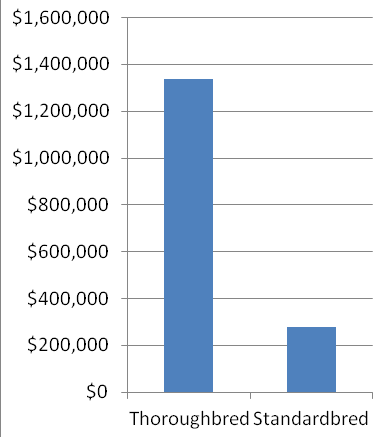
2012 contribution to the Virginia Breeders Fund reflects revenue raised by Thoroughbred vs. Standardbred (harness) racing
Source: Virginia Racing Commission, 2012 Annual Report
The two sides finally agreed to reduce the 2013 season down to 25 racing days, spread over five weeks in June-July. That short season allowed most Thoroughbred owners to race their horses only twice (allowing two weeks to recover), rather than the three times possible in the longer 2012 season.
To compensate for fewer races, Colonial Downs increased the amount of prize money ("purses") for the races by 15%, up to $230,000/day. Many races were maiden races (for horses that have never won) or claiming/allowance races (for lower-quality horses) with a $5,000-$15,000 purse, but the 2013 season also offered 16 stakes races with $1,755,000 in total prize money.28
The impact of the 25-day race season was significant. Attendance at the track, and the amount wagered in 2013, dropped by 25%.29
Virginia horse owners saw the change as benefiting the track and out-of-state horse owners, at the expense of Virginia-based stables. Colonial Downs officials said the reduction in 2013 saved the track $500,000 in operating costs:30
For 2014, negotiations between the horse owners and Colonial Downs failed and no contract was signed on schedule. There was no Thoroughbred race season in 2014, for the first time since 1997. During the 2013-14 negotiations with Thoroughbred owners/trainers, the track sought to retain the unlimited license that allowed year-round betting at OTB facilities but to offer a racing season of less than two weeks.
The mediator in the 2014 negotiations quit after Colonial Downs proposed a 6-day Virginia Derby Festival in September with $500,000/day in purses, but horse owners demanded a 28-day race season spread over eight weeks. Colonial Downs asserted that it had become a third-tier track, unable to attract the best horses from across the United States because prize money for each race was too low. Fewer races would allow bigger purses, attracting better horses. The horse owners claimed Colonial Downs was trying to hold just enough race days to justify keeping the OTB parlors open and allowing online betting:31
The impasse was described succinctly in an article in the Richmond Times-Dispatch:32
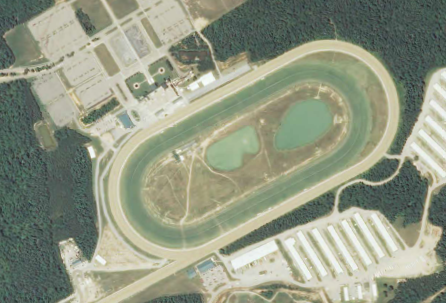
Colonial Downs has a grass track for Thoroughbred races inside the dirt oval for harness races
Source: US Geological Survey (USGS), Providence Forge 7.5x7.5 topographic quadrangle (2013)
Under Virginia's laws and regulations, satellite betting on Thoroughbred races was authorized only in years in which live Thoroughbred racing occurred in Virginia. When the old contract between the horsemen's association and Colonial Downs expired in February 2014, Colonial Downs had to stop off-track betting on Thoroughbred races.
Colonial Downs closed its OTB parlors in Alberta, Vinton, Henry County, and Scott County to reduce expenses. Those four parlors generated only 25% of Colonial Down's OTB business in 2012. Colonial Downs kept open the parlors with 75% of its OTB business in Hampton, Chesapeake, and West Broad/Glen Allen in Richmond area, where betting continued on harness races viewed on TV screens through simulcasts from other tracks.
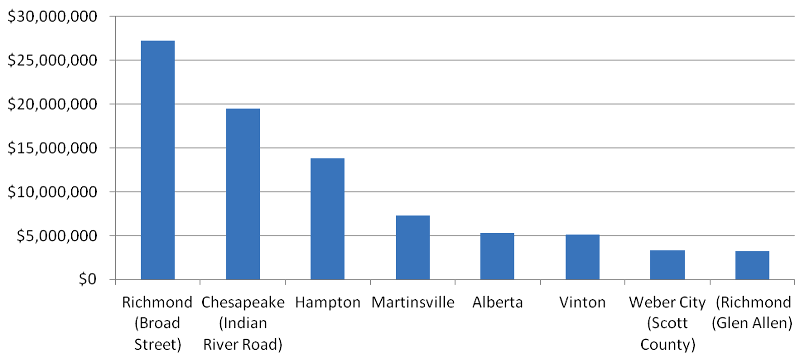
75% of Colonial Down's off-track betting occurred at the four OTB parlors located in Hampton Roads/Richmond
Source: Virginia Racing Commission, 2012 Annual Report
The harness racing contract was not involved in the Thoroughbred race season dispute. Betting continued in the still-open OTB parlors on out-of-state harness races, and the Fall 2014 season for harness racing was unaffected by the dispute with the Virginia Horsemen s Benevolent and Protection Association. Colonial Downs generated substantially less revenue in 2014 since there was much lower interest and a much lower handle for harness races.33
To get Thoroughbred racing re-started, the Virginia Racing Commission tried to force Colonial Downs to sign a contract with the Virginia Horsemen's Benevolent and Protective Association. The track filed a lawsuit saying that order was illegal, blocking implementation.
In October 2014, Colonial Downs signed a 10-year contract with a new group claiming to represent horse owners in Virginia, the Old Dominion Thoroughbred Association. Colonial Downs then announced that the track would close permanently if the Virginia Racing Commission rejected the contract and required reaching a deal with the Virginia Horsemen's Benevolent and Protective Association. That group claimed the contract was not legitimate because the Old Dominion Thoroughbred Association was a "sham organization" with no members in Virginia, and the Virginia Horsemen's Benevolent and Protective Association threatened its own lawsuit if the Virginia Racing Commission allowed the track to deal with the new group.34
When the track owner, Jeffrey Jacobs, realized that the Virginia Racing Commission would reject the plan to create a new Thoroughbred association, he relinquished the unlimited pari-mutuel betting license and announced Colonial Downs would close permanently on November 1, 2014.
The three OTB parlors in Richmond, Hampton, and Chesapeake remained open, taking online bets through the EZ Horseplay advance deposit wagering system but no longer accepting cash bets placed in person at the teller's window. Colonial Downs had a separate account-wagering license from the Virginia Racing Commission, allowing those OTB parlors to stay in business and for the company to continue accepting bets at EZ Horseplay kiosks in 100 restaurants, bars and bowling alleys.35
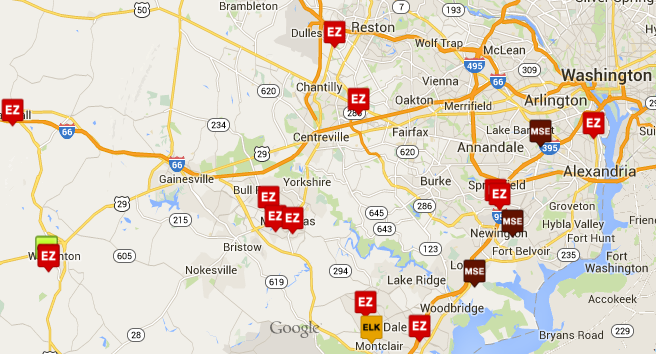
advance deposit wagering customers could bet at EZ Horseplay kiosks in Moose and Elk lodges, billiard parlors, gas stations, grocery stores, sports pubs - minimizing the need for an OTB parlor in Northern Virginia
Source: Colonial Downs, EZ Horseplay Kiosk Locations (on February 11, 2015)
The New Kent facility had been used for motorcross races, music festivals, and fairs, to generate revenue from activities other than horse racing. When he relinquished the license, Jacobs noted that big-purse racing was still possible if the state would direct more revenue to the track from non-racing activities.
Nearby states with pari-mutuel tracks subsidized their track's purses with profits from casino gambling. Colonial Downs was part of a private corporation owned by Jacobs focused on gaming, with casinos in Colorado and Nevada, but he recognized that getting Virginia to authorize casino gambling to subsidize horseracing purses was a 15-1 long shot:36

Colonial Downs failed to get approval for a new horseman's association and chose instead to shut down after the Fall, 2014 harness racing season
Source: Colonial Downs, Letter from Colonial Downs' President Ian Stewart to VHBPA President David Ross (April 8, 2014)

Colonial Downs advertised harness racing and events other than horse races in 2014
Source: Colonial Downs
In February 2015, the owners of the track and the Virginia Horsemen's Benevolent and Protective Association negotiated a truce. The Majority Leader in the State Senate represented the district in which the track was located, and he pressured the two sides to reach an agreement. New Kent County estimated that it lost as much as $400,000 in taxes due to the 2014 shutdown of Thoroughbred racing.
Under the deal, Colonial Downs would no longer receive its 5% of the online betting handle, which would be nearly $5 million/year if total online betting in Virginia met estimates of $94 million annually. Instead, that funding would be redirected to a new nonprofit organization, chosen by the Virginia Racing Commission, to promote various forms of horse racing - steeplechase, harness, and Thoroughbred - in Virginia. The expectation was that the Virginia Equine Alliance would serve that role, since it was created by the Virginia Horsemen's Benevolent and Protective Association, Virginia Gold Cup Association, Virginia Thoroughbred Association, and the Virginia Harness Horse Association.
Even if racing was not re-started at the track, the agreement committed to pay New Kent County a share of revenue from the bets placed at EZ-Play kiosks and OTB facilities for five years. The county supervisors amended their conditional-use permit for the track, authorizing special events unrelated to horse racing (such as festivals and music concerts) even though the track no longer held a license from the Virginia Racing Commission.37
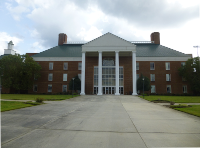 Colonial Downs entrance |
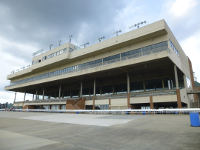 grandstand (trackside view) |
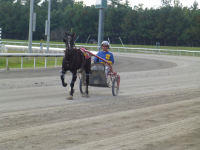 trotters are Standardbred horses |
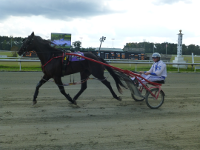 2-wheeled sulky at harness race |
By April 2015, negotiations for Colonial Downs to lease its track to a different operator had failed. The company laid off its remaining employees and closed both the OTB parlors and the 75 EZ-Play kiosks. It claimed that the shutdown in 2014 had resulted in a $3-4 million loss, and closed all operations to avoid the anticipated equivalent losses in 2015.
A Colonial Downs official accused the General Assembly and the Virginia Racing Commission of working with the horse owners, organized as the Virginia Horsemen's Benevolent and Protective Association (VHBPA), to shift racing to Northern Virginia:38
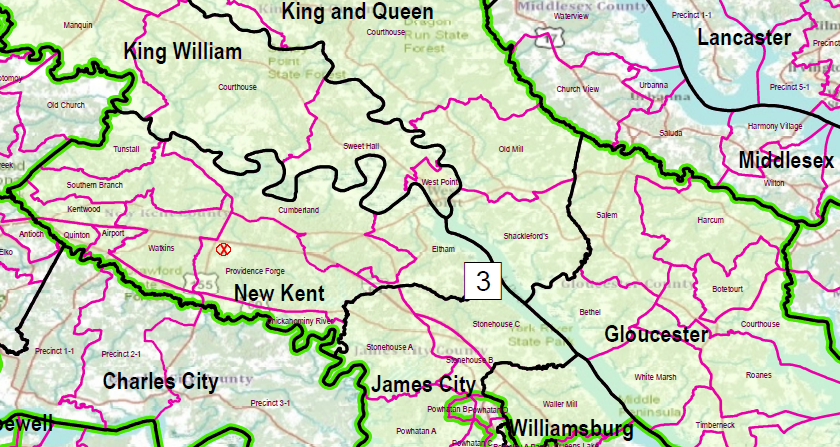
"Tommy" Norment Jr. represented Senate District 3 in the 2015 General Assembly, and as Majority Leader had influence to negotiate a deal to relicense the Colonial Downs track (red X) while the legislature was in session
Source: Virginia Division of Legislative Services, Current District Maps
1. Francis Marion Bush, Colonial Downs and More, iUniverse, 2011, pp.10-11, https://books.google.com/books?id=yRenra9nfccC (last checked April 22, 2019)
2. "Leesburg racetrack gets 1st betting license," Fredericksburg Free Lance-Star, September 26, 1991, http://news.google.com/newspapers?nid=1298&dat=19910926&id=xvdNAAAAIBAJ&sjid=OosDAAAAIBAJ&pg=2805,4188630 (last checked March 30, 2014)
3. "Churchill Downs Says It May Open Racetrack in Va," Washington Post, June 25, 1992, p.D3A; "De Francis' plan draws criticism from Va. rivals," Baltimore Sun, June 7, 1994, http://articles.baltimoresun.com/1994-06-07/sports/1994158030_1_virginia-racing-oaklawn-francis; "Proposed racetracks divide Virginia: boosters in south, protesters in north," Baltimore Sun, March 13, 1994, http://articles.baltimoresun.com/1994-03-13/sports/1994072213_1_portsmouth-virginia-beach-virginia-racing; "Va. panel visits Tidewater sites," Baltimore Sun, March 10, 1994, http://articles.baltimoresun.com/1994-03-10/sports/1994069150_1_portsmouth-track-churchill-downs (last checked April 5, 2014)
4. "Race is On For Site For Track," Washington Post, March 17, 1994, p.AVA-6; "De Francis' plan draws criticism from Va. rivals," Baltimore Sun, June 7, 1994, http://articles.baltimoresun.com/1994-06-07/sports/1994158030_1_virginia-racing-oaklawn-francis (last checked April 5, 2014)
5. "Loudoun Voters Defeat Bid to Build Horse-Racing Track," Washington Post, August 3, 1994, p.C1
6. "About Colonial Downs," Colonial Downs, http://www.colonialdowns.com/about (last checked April 9, 2014)
7. "Md., Ky. rivals present visions for Va. racing," Baltimore Sun, June 8, 1994, http://articles.baltimoresun.com/1994-06-08/sports/1994159123_1_churchill-downs-virginia-racing-horse-racing-track (last checked April 5, 2014)
8. "So Far Off The Beaten Track," Washington Post, September 24, 1999, p.D4; "At the Virginia Racing Commission, gray skies, then a downpour," Virginia Thoroughbred Association, October 16, 2014, http://www.vabred.org/at-the-virginia-racing-commission-gray-skies-then-a-downpour/ (last checked October 16, 2014)
9. "Md. Group Shifts Racetrack Proposal to Dulles Area," Washington Post, January 4, 1994, p.D4; "Lawyer From Arlington Leads the Field in Racetrack Effort: Va. Horse Racing Commission Setting Pace Out of the Gate," The Washington Post, July 6, 1989, p.VA_C1; "To save Colonial Downs, Va. should get off high horse," The Virginian-Pilot, May 9, 2014, http://hamptonroads.com/2014/05/save-colonial-downs-va-should-get-high-horse (last checked May 10, 2014)
10. "So Far Off The Beaten Track," Washington Post, September 24, 1999, p.D4
11. "Va. Derby pagentry masks Colonial Downs' struggles," The Virginian-Pilot, July 14, 2013, http://hamptonroads.com/2013/07/va-derby-pagentry-masks-colonial-downs-struggles (last checked April 8, 2014)
12. "State & County QuickFacts - Virginia," Bureau of Census, http://quickfacts.census.gov/qfd/states/51000.html; Terance J. Rephann, "The Economic Impact Of The Horse Industry In Virginia," University of Virginia - Weldon Cooper Center for Public Service, March 8, 2011, p.2, http://www.coopercenter.org/sites/default/files/econ/Reports/vahorsecenter.pdf (last checked June 17, 2014)
13. "Manassas Park Voters Beat Betting Measure," Washington Post, November 4, 2004, http://www.washingtonpost.com/wp-dyn/articles/A23615-2004Nov3.html; "Betting Parlor Defeated by Slim Margin," Washington Post, November 6, 1996, http://www.washingtonpost.com/wp-srv/local/reglelex/results/stories/region.htm; "Manassas Park Smears a Businessman," December 22, 2006, http://www.theagitator.com/2006/12/22/manassas-park-smears-a-businessman/; "Rosie's Gaming Emporium courts the public ahead of November ballot referendum in Manassas Park," InsideNOVA, September 27, 2023, https://www.insidenova.com/news/business/rosies-gaming-emporium-courts-the-public-ahead-of-november-ballot-referendum-in-manassas-park/article_c93fc5d6-5bd2-11ee-a85d-03c4e192c2b5.html (last checked September 27, 2023)
14. "Colonial Downs Holdings Inc. Announces Economic Projections for Proposed Dumfries Facility," Business Wire, August 4, 1999, http://www.thefreelibrary.com/Colonial+Downs+Holdings+Inc.+Announces+Economic+Projections+for...-a055346702; "Hard Ride at Colonial Downs," Fredericksburg Free Lance-Star, September 12, 1999, http://news.google.com/newspapers?nid=1298&dat=19990912&id=kwMzAAAAIBAJ&sjid=VggGAAAAIBAJ&pg=6833,3010644; Memorandum from Jim Burgess, Prince William County Historical Commission, to Debrarae Karnes, Prince William Planning Office, July 5, 1999, http://eservice.pwcgov.org/library/digitallibrary/hsdw/B_Folder/BullRunChapelLogmillRd76-102/pdfs/BullRunChapelLogmill%20Rd76-102SurvA.pdf; "Group Vying for Va. Racetrack Proposes Prince William Site," Washington Post, June 9, 1993, p.B1; "N.Va. Group Buys Land For Pr. William Racetrack: Investors Enter Race for Betting License," Washington Post, July 23, 1993, p.D3 (last checked March 30, 2014)
15. "Tracks's Fate at Backstretch," Fredericksburg Free Lance-Star, November 18, 1999, http://news.google.com/newspapers?nid=1298&dat=19991118&id=x-wyAAAAIBAJ&sjid=mAgGAAAAIBAJ&pg=6759,4293693; "Trade And Commerce: Horse Racing And Pari-Mutuel Wagering," Office of Attorney General, 99-104, http://www.oag.state.va.us/Opinions%20and%20Legal%20Resources/Opinions/2000opns/feb004.pdf (last checked March 30, 2014)
16. "Gambling In Virginia," Newport News Daily Press, February 15, 1998, http://articles.dailypress.com/1998-02-15/news/9802130278_1_off-track-referendum-betting; "Four Virginia Localities OK Off-Track Betting," Bloodhorse, December 1, 2004, http://www.bloodhorse.com/horse-racing/articles/25630/four-virginia-localities-ok-off-track-betting (last checked March 30, 2014)
17. "After Gambling's Demise, Town Looks to Roll Dice Again," Washington Post, September 12, 2004, http://www.washingtonpost.com/wp-dyn/articles/A14829-2004Sep11.html; "Maryland off-track betting parlors struggle," Baltimore Sun, February 27, 2011, http://articles.baltimoresun.com/2011-02-27/business/bs-bz-off-track-betting-decline-20110227_1_otb-facilities-maryland-off-track-john-pappy-poole (last checked March 30, 2014)
18. "Tracks to Play," EZ Horseplay, https://www.ezhorseplay.com/tracks, "In Virginia, cold weather and a heated disagreement," The Racing Biz, February 3, 2014, http://www.theracingbiz.com/2014/02/03/virginia-cold-weather-heated-disagreement/; " 59.1-369. Powers and duties of the Commission," Code of Virginia, http://law.lis.virginia.gov/vacode/title59.1/chapter29/section59.1-369/ (last checked March 30, 2014)
19. "Horse Track Plans Under Consideration," Free Lance-Star, August 31, 1999, http://news.google.com/newspapers?nid=2472&dat=19990831&id=e6JjAAAAIBAJ&sjid=TAgGAAAAIBAJ&pg=6653,8629716 (last checked April 8, 2014)
20. "Virginia Cautious on OTB Proposal," Washington Post, December 5, 1992, p.D9
21. C. Fred Kohler, "Does horse racing have a future in Virginia?," Virginia Issues and Answers, Vol. Six, Num. One (May 1999), Virginia Polytechnic Institute and State University, http://www.via.vt.edu/spring99/horse.html; "Powers and duties of the Commission," Virginia State Code, Section 59.1-369(4), https://leg1.state.va.us/cgi-bin/legp504.exe?000+cod+59.1-369 (last checked March 30, 2014)
22. "Number of Races," Fact Book, The Jockey Club, 2014, http://www.thejockeyclub.com/default.asp?section=FB&area=6; "Online gambling gets slow but steady push in U.S.," Daily Racing Form, July 18, 2013, http://www.drf.com/news/online-gambling-gets-slow-steady-push-us; "Virginia Lottery had one of its best months ever while its advertising went off-air," Virginia Mercury, April 24, 2019, https://www.virginiamercury.com/2019/04/24/virginia-lottery-had-one-of-its-best-months-ever-while-its-advertising-went-off-air/; "The Lottery works for education," Virginia Lottery, https://valottery.com/playingmatters/givingback (last checked April 25, 2019)
23. Amy Godfrey, Tess Meinert, Tom S. Witt, "The Economic Impact of the Charles Town Thoroughbred Horse Racing Industry on the Jefferson County and West Virginia Economies 2010," West Virginia University, November 2011, p.6, http://www.harnesstracks.com/docdatabase/alice/5364.pdf (last checked April 5, 2014)
24. "Strategic Plan," Virginia Racing Commission, 2010-2012 Biennium, http://vaperforms.virginia.gov/agencylevel/stratplan/spReport.cfm?AgencyCode=405; "2014 Virginia Fact Book," The Jockey Club, p.5, http://www.jockeyclub.com/factbook/StateFactBook/Virginia.pdf (last checked April 5, 2014)
25. "Colonial cuts Virginia Derby purse," The Handicappers Edge, March 2, 2018, http://www.brisnet.com/cgi-bin/editorial/news/article.cgi?id=10690; "Once alone, Virginia Derby finds its niche crowded by wealthy rivals," The Racing Biz, February 21, 2014, http://www.theracingbiz.com/2014/02/21/alone-virginia-derby-finds-niche-crowded-wealthy-rivals/; "Sixteen Years Later, Colonial Downs Still Fighting for the Lead," Paulick Report, July 15, 2013, http://www.paulickreport.com/news/ray-s-paddock/sixteen-years-later-colonial-downs-still-fighting-for-the-lead/ (last checked April 6, 2014)
26. "Midlantic tracks among leaders in jockey insurance," The Racing Biz, April 4, 2014, http://www.theracingbiz.com/2014/04/04/midlantic-tracks-among-leaders-jockey-insurance/ (last checked April 8, 2014)
27. "Breeders Fund Award Winners," Virginia Thoroughbred Association, http://www.vabred.org/breeders-fund-award-winners/; "2012 Annual Report," Virginia Racing Commission, http://leg2.state.va.us/dls/h&sdocs.nsf/fc86c2b17a1cf388852570f9006f1299/47e285f518dfe6bf852579b30052542d/$FILE/RD93.pdf (last checked March 30, 2014)
28. "16th Annual Virginia Derby Headlines Colonial Downs 2013 Stakes Lineup," Colonial Downs, January 3, 2013, http://www.colonialdowns.com/news/1530.html?fid=379; "Va. Derby pagentry masks Colonial Downs' struggles," The Virginian-Pilot, July 14, 2013, http://hamptonroads.com/2013/07/va-derby-pagentry-masks-colonial-downs-struggles (last checked April 8, 2014)
29. "Virginia racing interests dig in for lengthy battle," The Racing Biz, April 8, 2014, http://www.theracingbiz.com/2014/04/08/virginia-racing-interests-dig-lengthy-battle/ (last checked April 9, 2014)
30. "Virginia horsemen, Colonial Downs at odds over race season," Richmond Times-Dispatch, March 28, 2014, http://www.timesdispatch.com/sports/equestrian/racing/virginia-horsemen-colonial-downs-at-odds-over-race-season/article_46b0626c-ada6-5032-a4d1-966986196604.html (last checked March 30, 2014)
31. "Virginia HBPA: Time for new management at Colonial?," The Racing Biz, March 24, 2014, http://www.theracingbiz.com/2014/03/24/virginia-hbpa-time-new-management-colonial/; "Contract Dispute Continues to Pause Betting at Colonial Downs," Williamsburg Yorktown Daily, March 15, 2014, http://wydaily.com/2014/03/15/contract-dispute-continues-to-pause-betting-at-colonial-downs/; "Colonial Downs: Meeting set for March 27 over live-racing dates," Local Affiliate News for Virginia HBPA, National HPBA.com, http://www.hbpa.org/NewsDisplay.asp?section=2&type=l&Affid=30
(last checked April 9, 2014)
32. "Horse racing commission pursuing fall season," Richmond Times-Dispatch, August 19, 2014, http://www.timesdispatch.com/business/local/horse-racing-commission-pursuing-fall-season/article_3828db87-00ce-558a-808a-3c69b4ea1faa.html (last checked August 22, 2014)
33. "Arbitration yields no gains for Va. horse racing," Fredericksburg Free Lance-Star, March 12, 2014, http://news.fredericksburg.com/newsdesk/2014/03/12/arbitration-yields-no-gains-for-va-horse-racing/; "Several Virginia OTBs Closing During Dispute," Blood Horse, January 31, 2014, http://www.bloodhorse.com/horse-racing/articles/83132/several-virginia-otbs-closing-during-dispute; "Contract Dispute Continues to Pause Betting at Colonial Downs," Williamsburg Yorktown Daily, March 15, 2014, http://wydaily.com/2014/03/15/contract-dispute-continues-to-pause-betting-at-colonial-downs/; "2012 Annual Report," Virginia Racing Commission, http://leg2.state.va.us/dls/h&sdocs.nsf/fc86c2b17a1cf388852570f9006f1299/47e285f518dfe6bf852579b30052542d/$FILE/RD93.pdf (last checked March 30, 2014)
34. "Breaking: Colonial Downs reps says it will close if VRC doesn't approve new horsemen's group," Tidewater Review, October 4, 2014, http://www.tidewaterreview.com/news/va-tr-breaking-colonial-downs-court-case-out-new-horse-organization-in-if-racing-commission-approve-20141002,0,1873316.story (last checked October 15, 2014)
35. "Bettors react to new way of remote wagering," Richmond Times-Dispatch, October 31, 2014, http://www.timesdispatch.com/business/local/bettors-react-to-new-way-of-remote-wagering/article_23c72692-5958-529f-b5c6-9e4a9244edef.html; "Horse racing betting will continue in Virginia," The Virginian-Pilot, October 30, 2014, http://hamptonroads.com/2014/10/horse-racing-betting-will-continue-virginia (last checked November 2, 2014)
36. "Owner: Colonial Downs to shut down Nov. 1," The Virginian-Pilot, October 15, 2014, http://hamptonroads.com/2014/10/owner-colonial-downs-shut-down-nov-1; "Colonial Downs surrenders racing license," Daily Racing Form, October 15, 2014, ; "Colonial Downs Announces Shutdown To Occur November 1st, 2014 Absent Virginia Racing Commission Support," Colonial Downs news release, October 4, 2014, http://www.colonialdowns.com/pdf/pressRelease_%2010-3-14.pdf(last checked October 16, 2014)
37. "New Kent included in Colonial Downs, horsemen agreement," Newport News Daily Press, February 10, 2015, http://www.dailypress.com/business/tidewater/va-tr-new-kent-included-in-colonial-downs-horsemen-agreement-20150210-story.html; "Assembly backs bills that could restart horse racing at Colonial Downs," Richmond Times-Dispatch, February 19, 2015, http://www.richmond.com/business/local/article_f3b803b0-b4b6-5a2d-b4ce-2e03acd4763e.html; "2015 Fiscal Impact Statement - Bill Number: HB1934," Department of Planning and Budget, February 2015, http://leg1.state.va.us/cgi-bin/legp504.exe?151+oth+HB1934F122+PDF (last checked February 19, 2015)
38. "Colonial Downs to lay off 32 remaining employees, shut off-track betting parlors," Richmond Times-Dispatch, April 7, 2015, http://www.richmond.com/business/local/article_b05eb29f-915f-5298-b157-ec2b3dd437b5.html; "Colonial Downs to Immediately Close All Horse Racing Wagering Venues," Colonial Downs, April 7, 2015, (last checked April 8, 2015)
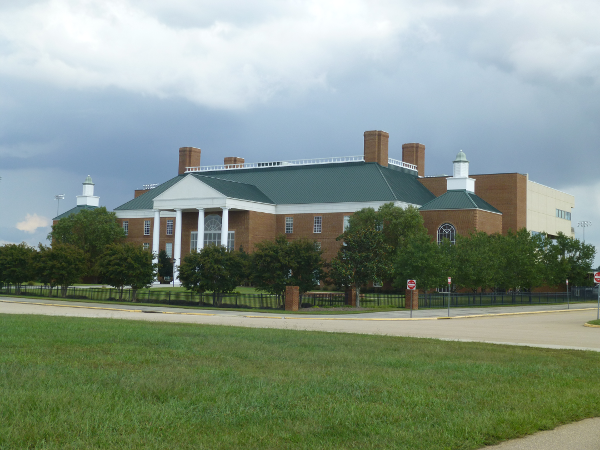
Colonial Downs
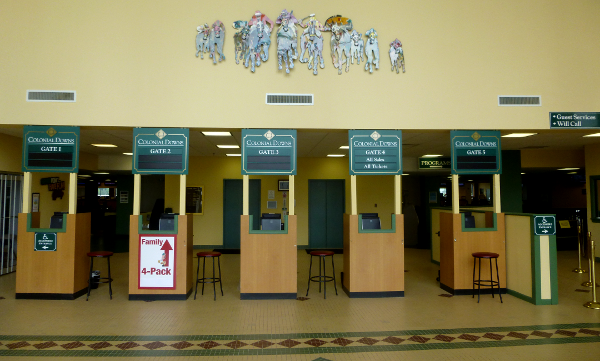
entrance to Colonial Downs grandstand
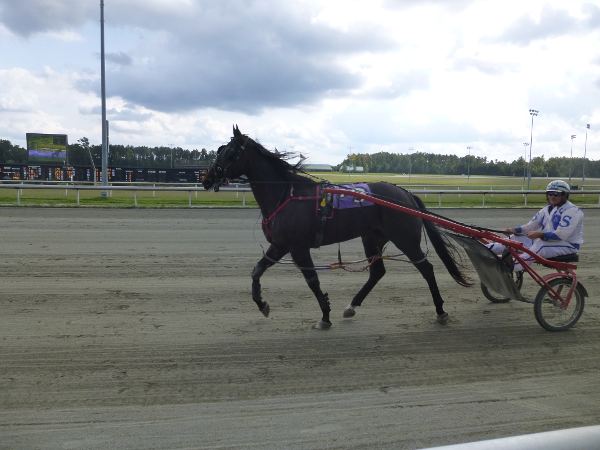
in harness races, Standardbred horses pull a rider in a 2-wheel sulky at 30 miles/hour
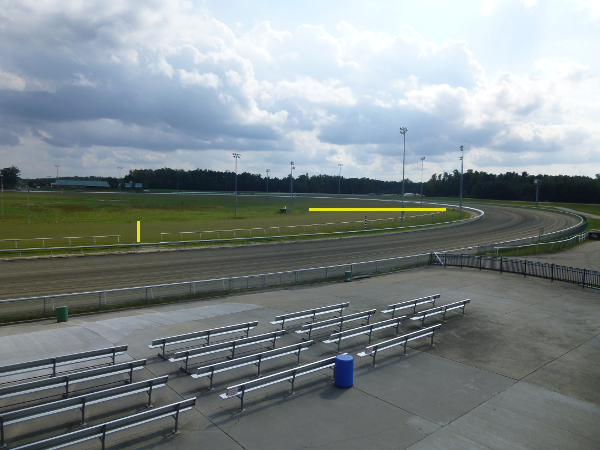
inside the dirt track for harness races, Colonial Downs has a separate grass track for Thoroughbred racing (marked by yellow lines)
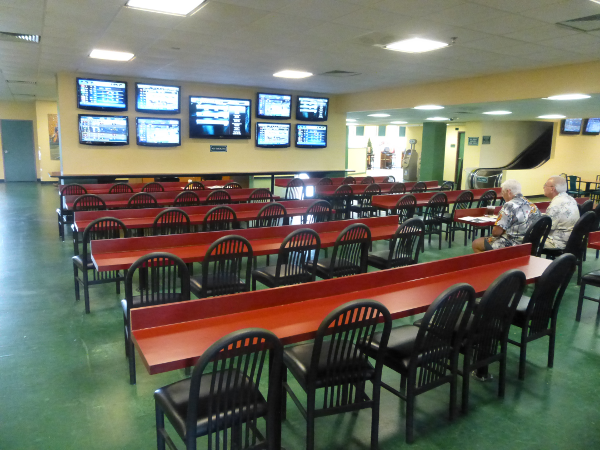
grandstand offers streaming video for watching and betting on races at other tracks
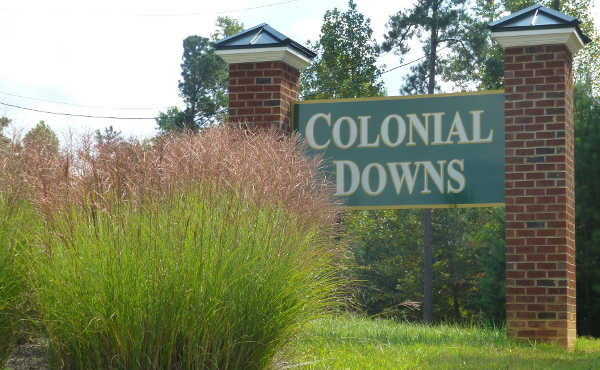
Colonial Downs
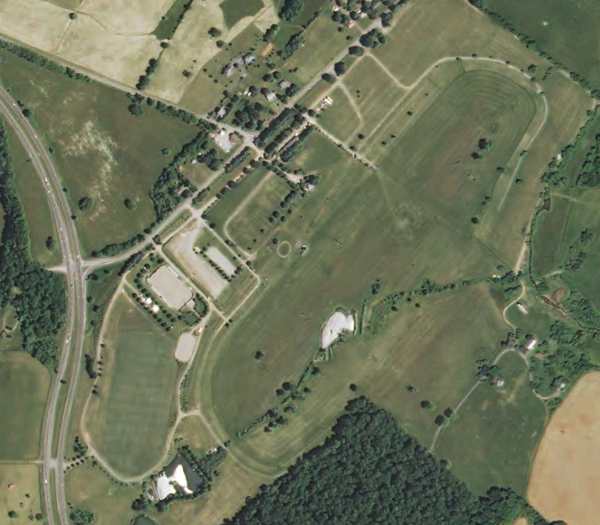
the Great Meadow racetrack near I-66 in northern Fauquier County hosts the Gold Cup steeplechase races
Source: US Geological Survey, Marshall 7.5x7.5 topographic map